28 days ago
Global RPC Nodes for Rollups and Apps
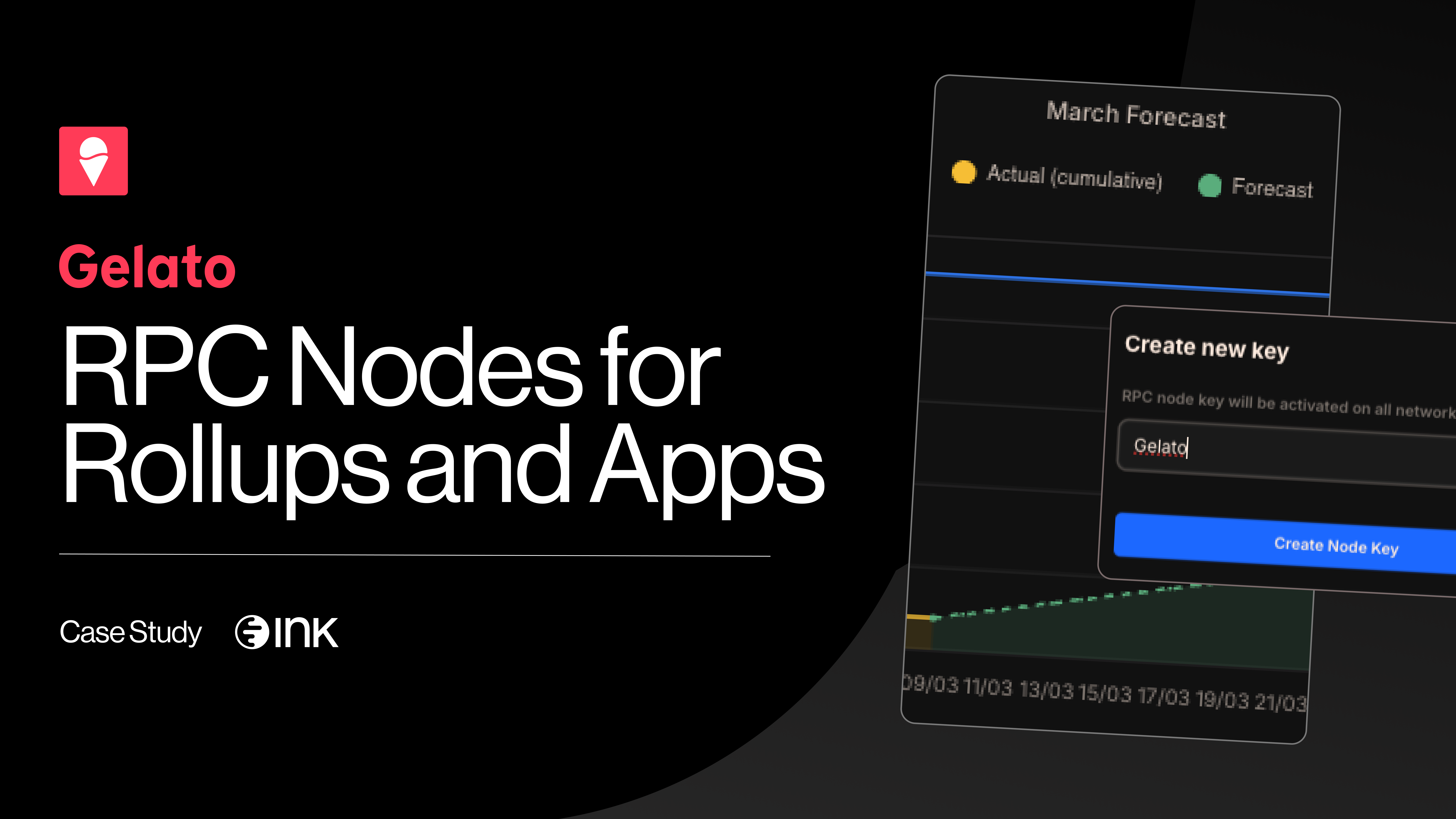
As modular blockchains break through the gigagas ceiling, we’re entering an era where applications routinely generate tens of thousands of RPC requests per second. Performance isn’t a nice-to-have; it’s a hard requirement.
Gelato RPC Nodes are purpose-built for this new scale the rollup economy is dictating, powering high-throughput rollups like Kraken’s Ink Chain with the speed, resilience, and elasticity needed to keep up with next-gen demand.
Run your apps on RPC infrastructure built by the same engineers who run the rollups. No guesswork, just performance.
What is an RPC Node?
If you’re building on rollups, chances are your app needs to read and write blockchain data — fast, reliably, and at scale. That’s where Remote Procedure Calls (RPC) come in. An RPC is a lightweight communication protocol that lets your app (the client) request specific data or execute logic on a blockchain node, without needing to know the internal details of how that server is set up. In this model, your app is the client, and the RPC node is the entry point to your rollup. A Gelato Private RPC Node is a high-performance Node that runs the necessary software to process these requests. You interact with RPC nodes through RPC endpoints, network-accessible URLs that your app connects to in order to query blockchain data or send transactions. These endpoints are what keep your app in sync with the chain.
What are the different types of RPC Infrastructure?
Public RPC endpoints
Public RPC endpoints are the default access layer for most users interacting with chains via wallets. While convenient, they’re shared, rate-limited infrastructure typically maintained by core protocol teams. Designed for accessibility rather than performance, they handle high volumes of unauthenticated traffic, making them unreliable for production use. Congestion, unpredictable latency, lack of SLAs, and zero support make them a poor foundation for apps that require consistency, throughput, and scale.
Private RPC endpoints
Private RPC endpoints are provisioned exclusively for your application, ensuring isolated throughput and consistent performance under load. Unlike shared infrastructure, private endpoints aren’t affected by noisy neighbors, enabling high latency, higher rate limits, and dedicated bandwidth. At Gelato we pair these with service-level agreements (SLAs) that define uptime and response guarantees making them the default choice for production-grade apps that can’t afford variability or downtime.
Alternative RPC endpoints
Alternative RPC endpoints serve as a failover infrastructure, allowing your application to maintain continuity in the event of degraded performance or downtime from your primary provider. By configuring multiple endpoints at the client or middleware layer, your app can dynamically route traffic to a backup RPC node, preserving availability and minimizing the risk of a single point of failure. In high-uptime environments, having redundant endpoints is a best practice for fault tolerance and graceful degradation.
With Gelato, fault tolerance isn’t a patch, it’s embedded into the core architecture. Our globally distributed, autoscaling RPC infrastructure is engineered from the ground up to support high-throughput rollups, with built-in redundancy, active failover, and elastic capacity that adapts in real-time to traffic spikes and network conditions.
High-performance RPC Infrastructure
Gelato RPC Nodes are designed with a clear focus: let developers ship faster, with fewer bottlenecks. Everything from API access to tooling is optimized for real-world workflows. Developers can use a single API key to access multiple rollups across the Gelato ecosystem. Whether you're testing a new feature or scaling production traffic, you don’t need to reconfigure endpoints or manage fragmented access layers. Want to roll back and analyze an onchain event from a month ago? Archive data access is built-in. Need to debug a failing transaction in production? Trace and re-execute it with full visibility. Want to understand your RPC usage patterns? Real-time dashboards give you method call volume without third-party monitoring.
Gelato abstracts away the ops overhead so developers can focus on what actually matters: building applications that work, scale, and deliver value to users.
Native Archival RPC Node Support
Some use cases demand more than just the latest block. Whether you're analyzing historical onchain behavior, auditing long-running contracts, or debugging events from weeks ago — access to full archive data is critical.
Gelato RPC Nodes come with archival support out of the box. No need to spin up separate infrastructure or rely on slow, third-party solutions. You get:
-
Instant access to historical state, trace back to genesis if needed
-
Consistent performance for deep queries, even under load
-
Full compatibility with standard archive methods like
`eth_getLogs`, `debug_traceTransaction`
With archive access baked into the core infrastructure, developers can explore the entire chain history with production-grade performance.
Enterprise-grade RPC security
Gelato RPC Nodes are secured by default, with multiple layers of protection to safeguard your endpoints and traffic:
Token-Based Authentication: Only signed requests with valid credentials are processed
Domain & IP Whitelisting: Ensure only white-listed domains and server IPs can access your endpoints - ideal for tightly controlled environments and backend integrations.
Whether you’re serving internal tooling or public-facing apps, you stay protected against misuse, spam, and unauthorized access. It’s everything you need to move from prototype to production with confidence.
75% faster RPC response times
Latency matters. Users don’t like to wait. And when your app is backed by slow infrastructure, those milliseconds add up in onboarding flows, in in-app transactions, in developer tooling. Eventually, it costs you usage and retention. Gelato RPC Nodes deliver 75% faster response times than legacy RPC providers on Gelato Rollips. That’s not just marketing it’s measurable performance, battle-tested in live production environments.
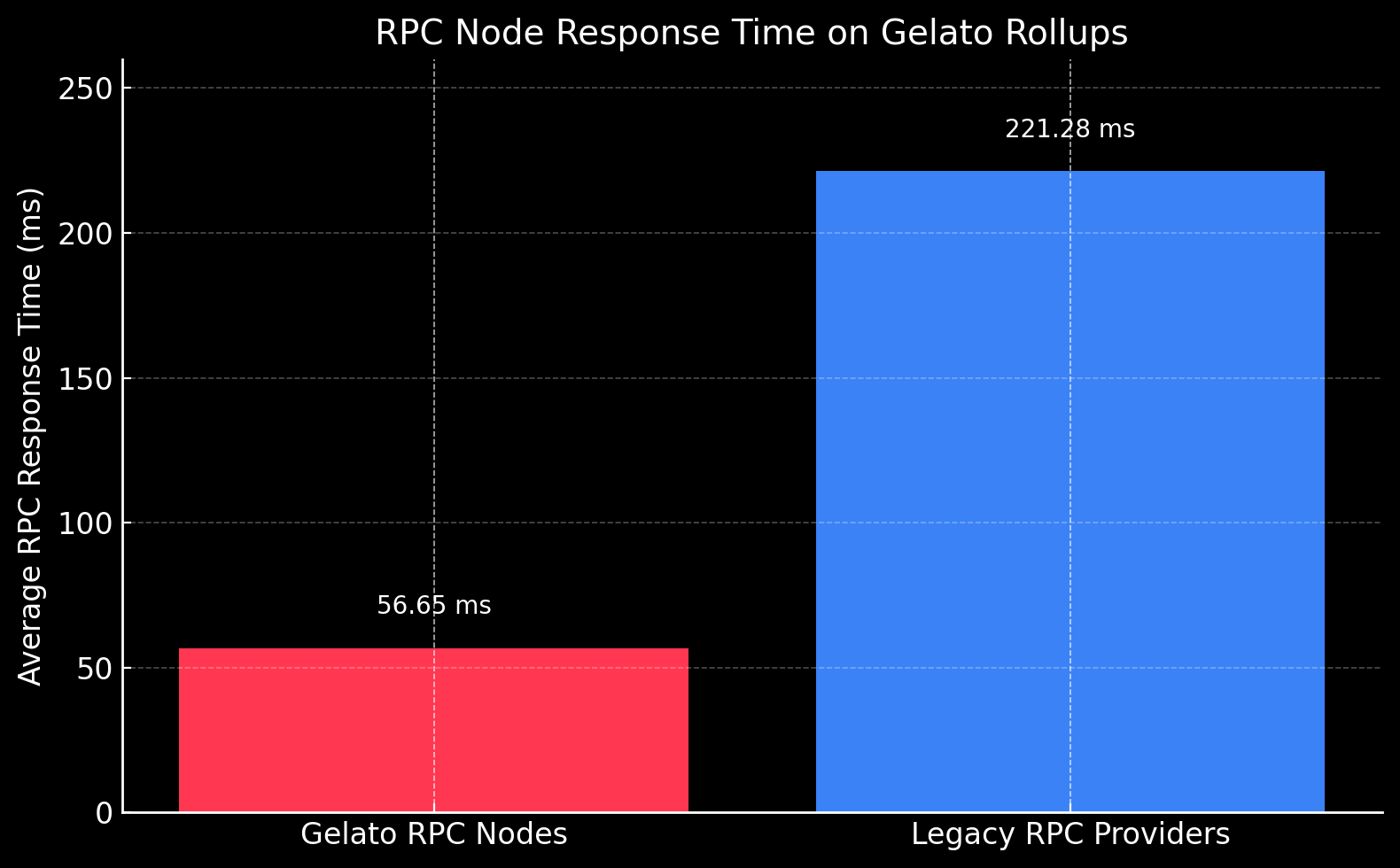
The infrastructure is globally distributed, meaning your users get near-instant access to blockchain data no matter where they are. Whether your app serves users in Seoul, Berlin, or San Francisco, they get the same snappy performance.
And with elastic autoscaling, Gelato automatically adjusts capacity to meet your traffic. Spikes are absorbed. Lulls are optimized. Your app stays fast, no matter the load with no need for manual provisioning or intervention.
RPCs with 99.99% uptime SLAs
Founders building performance-critical applications can't rely on brittle RPC infrastructure. Many legacy providers run on centralized, single-region deployments with limited redundancy, making them vulnerable to hardware failures, regional outages, or sudden load spikes.
Gelato RPC Nodes are architected for high availability from day one. We deploy across multiple cloud providers, data centers, and geographies with active-active redundancy and load-aware traffic distribution. If a region or node goes offline, traffic is automatically rerouted with zero disruption to the client.
While most standard nodes operate at ~72% uptime due to capacity bottlenecks and single points of failure, Gelato consistently delivers 99.99% uptime. A the result of a distributed systems approach to RPC, with observability, health checks, and failover logic built into every layer.
Accurate and consistent RPC responses
Block mismatches and stale data don’t just slow you down they break things. If your app relies on real-time blockchain state, even small inconsistencies can cause cascading bugs, failed transactions, or incorrect logic execution. Gelato solves this at the infrastructure layer with coordinated load balancing and internal verification systems. The result: zero recorded block inconsistencies, even under high throughput.
Built-in RPC analytics
High availability is only meaningful if you can verify and monitor it. That’s why Gelato RPC Nodes come with built-in observability- no need to wire up Prometheus or build your own dashboards from scratch.
Developers get real-time metrics out of the box, including:
-
Method call volume over time
-
Error rates and HTTP status breakdowns
This gives you a live window into your app’s interaction with the network whether you’re debugging a spike in eth_getLogs, monitoring throughput during a mint, or optimizing for latency across geographies.
Every metric is surfaced in the Gelato dashboard, so infra and product teams can share the same operational view without friction.
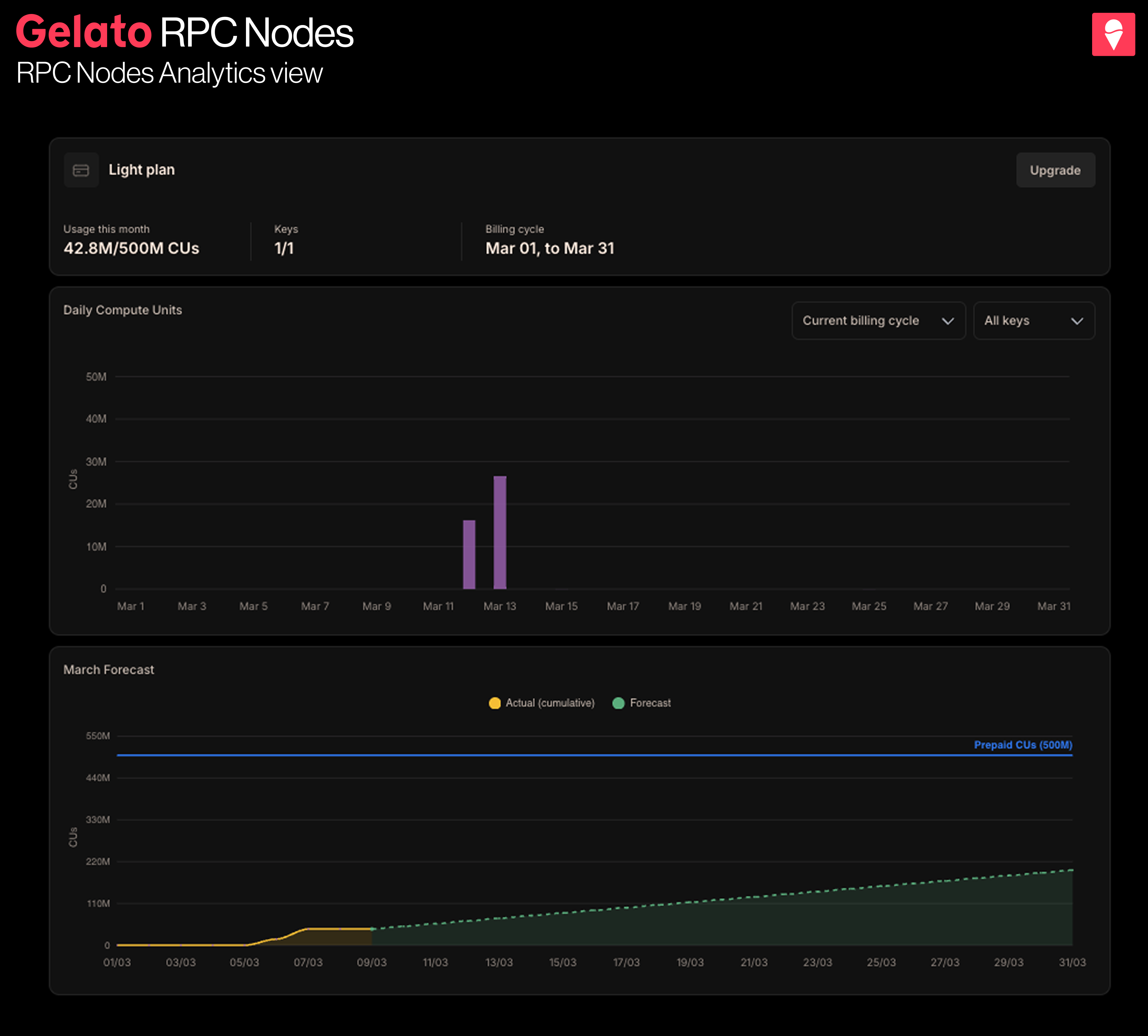
Autoscale RPC infrastructure
Rollups introduce the potential for massive throughput, but without elastic infrastructure, that potential gets bottlenecked fast. Traditional RPC stacks struggle with traffic spikes, requiring manual node provisioning, preemptive over-provisioning, or reactive scaling scripts that rarely respond quickly enough.
Gelato RPC Nodes handle this differently.
Autoscaling is built directly into the RPC layer. As traffic increases, new nodes are provisioned automatically with traffic distributed across the pool to maintain low latency and high availability. When demand drops, capacity is scaled down to minimize overhead. No manual intervention, no guessing load thresholds.
Beyond throughput, autoscaling also functions as a failover mechanism. If a node becomes unhealthy or fails under load, it’s removed from rotation and replaced in real-time. This ensures continued availability during spikes, partial outages, or regional degradation — without requiring app-side logic or additional load balancers.
Because the scaling logic is native to the infrastructure itself, you don’t have to engineer around capacity limits the system adapts to usage patterns on its own.
Get unbounded RPC capacity that scales with your app — and you only pay for what you use.
How to get started with Gelato RPC Nodes
Getting set up with Gelato RPC Nodes takes just a few minutes. Whether you’re deploying a production app or testing a new feature, you’ll have high-performance infrastructure at your fingertips. Here’s how to get started:
-
Create a Gelato Account Head over to raas.gelato.network and search for RPC node section.
-
Create your RPC Node Key Click “Create RPC Key” to spin up your first RPC instance.
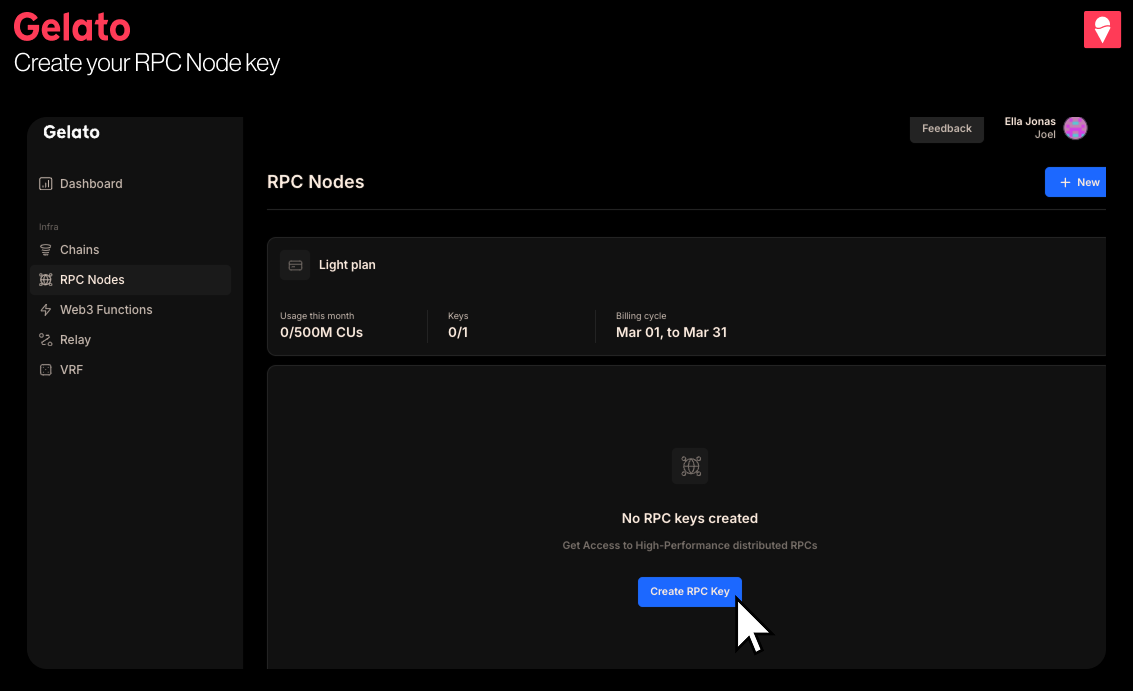
- Name your RPC Node Key Add a unique name and your Private Node Key is ready.
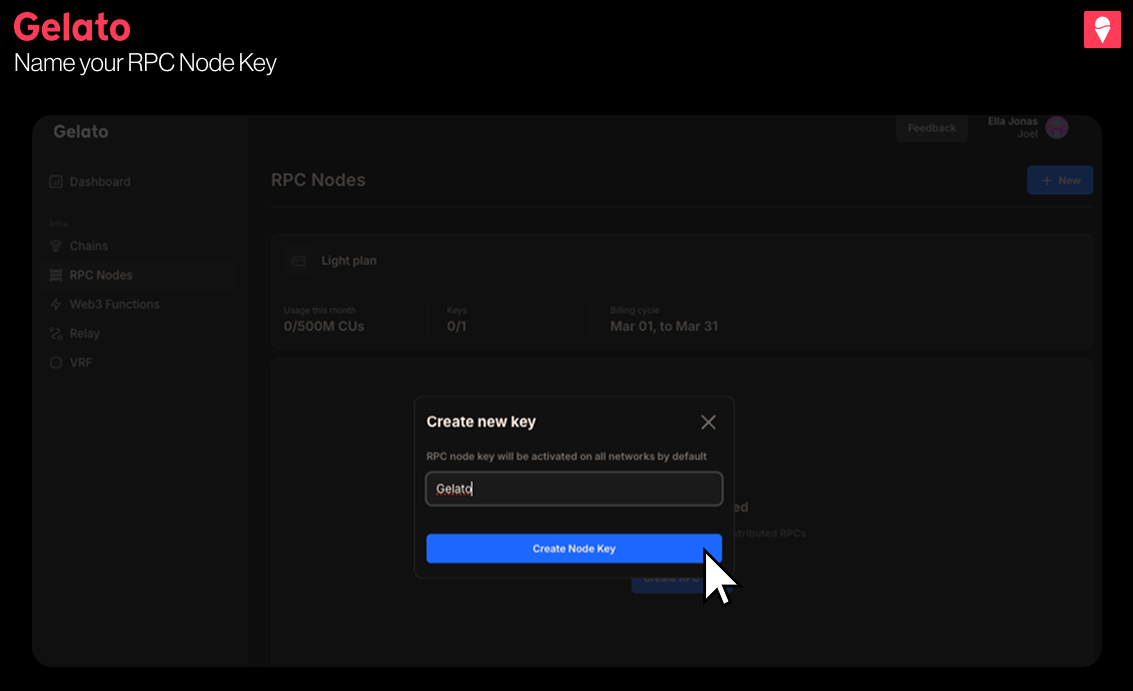
- Choose your rollup Select the Gelato Rollup you want to connect to, including chains like Ink, Open Campus, Lisk, or Reya and more, and specify whether you’re targeting mainnet or testnet.
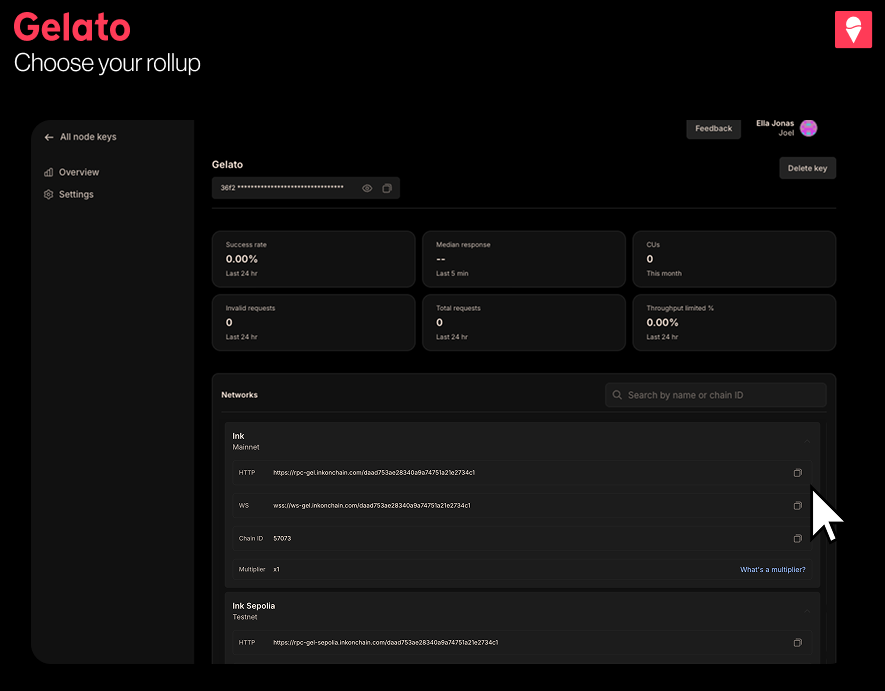
- Go Live Copy the URL you can now start sending RPC requests directly from your app or tooling. You’re live.
Gelato is your RPC Node provider for rollups
Chains like Kraken’s Ink, Animoca’s Open Campus, Lisk, and Reya are already live on Gelato RPC Nodes not just because they need performance but because they can’t afford compromise.
Teams are building on the bleeding edge, leveraging high-performance modular stacks like ABC to deploy 1 gigagas+ rollups that push beyond the limits of monolithic chains. At that scale, infrastructure isn’t just a support layer it’s the execution engine. They need RPC that holds up under pressure, scales automatically with demand, and delivers consistent performance under millions of requests per second. If you're building on rollups, your infrastructure has to be just as ambitious.
Get started now: https://raas.gelato.network/

